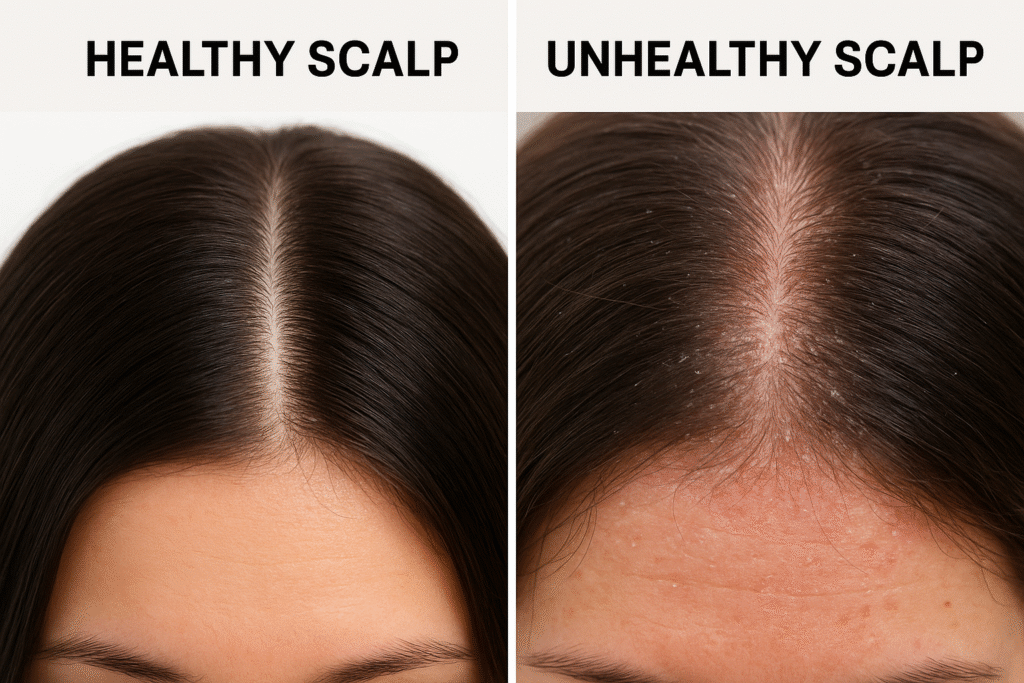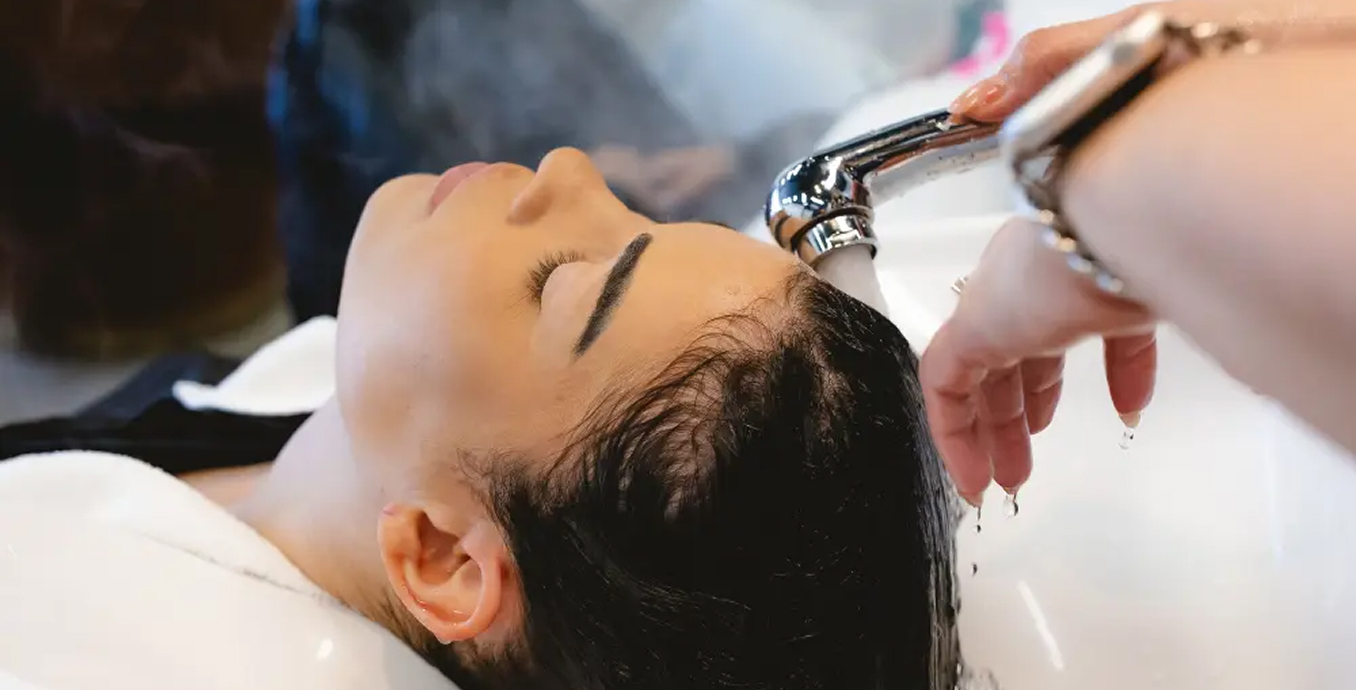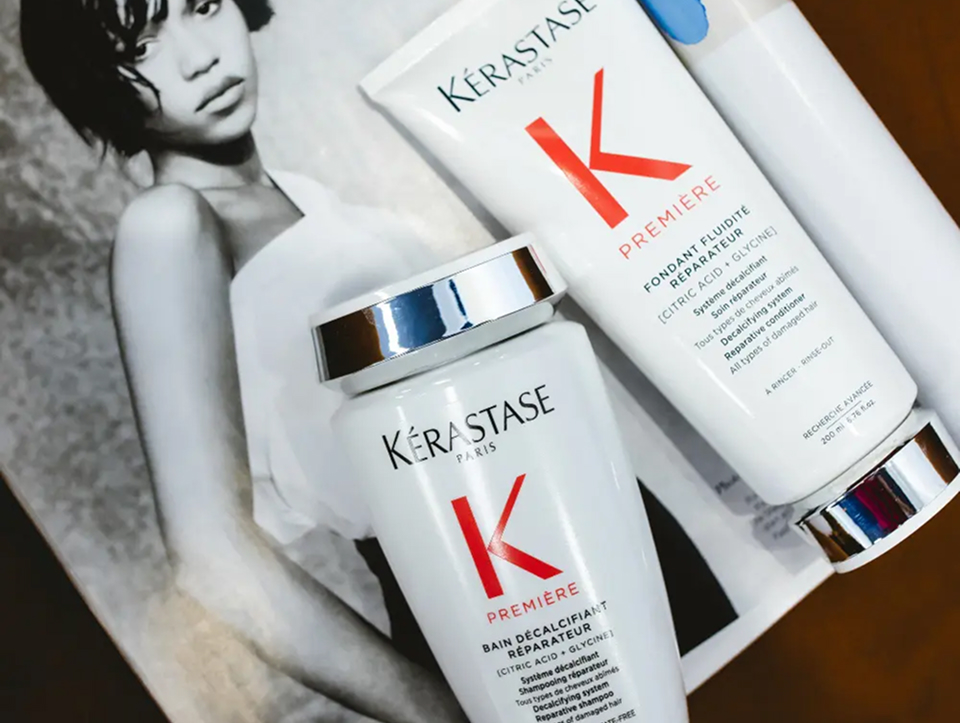Taking care of your scalp isn’t just a daily habit; it’s a year-round commitment. Seasonal shifts change how your scalp behaves, impacting moisture levels, oil production, sensitivity, and even hair shedding.
This guide breaks down why seasonal scalp care matters, how each season affects your scalp, the symptoms to watch for, and the best products and treatments to keep your scalp balanced and healthy.
Our updated approach blends seasonal routines, symptom-based guidance, clinical insight, and practical product recommendations to help you maintain strong, healthy hair year-round.
Quick Scalp Check
Not sure what your scalp needs right now? Use this quick guide:
- Tight, itchy, white flakes → Likely a dry scalp
- Greasy roots with flakes or odor → Likely an oily scalp
- Burning, redness, soreness (especially with sweat) → Sensitive or inflamed scalp
- More shedding in fall or winter → Seasonal hair cycle + dryness
💡 If symptoms change with the weather, your scalp care routine should too.
Why Seasonal Scalp Care Matters?

Your scalp isn’t static — it responds to the environment. Each season affects:
- Oil production (dry winter vs. oily summer)
- Hydration levels (humidity in spring vs. dry fall)
- Scalp sensitivity (UV exposure, frizz, dandruff risk)
Ignoring these shifts can lead to chronic dryness, buildup, irritation, or increased hair fall.
By adjusting your routine to account for seasonal factors, you prevent dryness, flaking, and hair damage, ensuring a healthy scalp year-round.
💡 Tip: Keep a simple seasonal checklist of treatments and products to avoid missing key care steps.
Seasonal Scalp Symptoms & What They Mean

Dryness & Flaking (Fall + Winter)
- Caused by low humidity, indoor heating, and reduced oil production.
- Often leads to visible flakes, tightness, and itchiness.
- It can worsen dandruff or seborrheic dermatitis if unmanaged.
Redness, Burning, or Inflammation (Summer + Winter)
- In summer: UV exposure, sweat buildup, and product residue irritate the scalp.
- In winter, dryness weakens the scalp barrier, making it reactive.
- A burning scalp is often a sign of inflammation, allergy, or barrier disruption.
Oily Scalp & Buildup (Spring + Humid Seasons)
- Humidity increases sebum production.
- Sweat + oil = clogged follicles, odor, mild flaking, and flat roots.
👉 Learn more about humectants for hair
Seasonal Hair Shedding (Fall)
- More shedding is normal in autumn due to the natural hair growth cycle.
- A lack of moisture or inflammation can make it feel more pronounced.
💡 Check out these holiday hair care tips and must-have winter hair care products
How to Tell If Your Scalp Is Dry, Oily, or Sensitive

Dry Scalp Signs:
- Tightness after washing
- Flakes that look small and white
- Hair feels rough or dull
- Reacts to hot water or harsh shampoos
Oily Scalp Signs:
- Greasy roots the day after washing
- Flaking accompanied by oiliness
- Heavy, limp hair
- Breakouts along the hairline or scalp
Sensitive/Reactive Scalp Signs:
- Burning sensation
- Red patches
- Painful or irritated follicles
- Reaction to new products or weather changes
🌿 Learn more about hair care goals for 2026
Seasonal Scalp Care Routines
Spring: Reset & Balance

For seasonal scalp care, spring brings rising humidity, which can lead to oiliness and mild flaking. Your scalp needs gentle cleansing and hydration.
Tips:
- Exfoliate once a week with a gentle scalp scrub to remove buildup and stimulate blood flow.
- Hydrate with a moisturizing treatment or hair mask
- Control frizz with anti-humidity serums
- Use sulfate-free shampoos to gently cleanse without stripping oils
- Consider a scalp therapy treatment to reset your scalp’s health
💡 Tip: Schedule a scalp massage weekly to boost circulation and hydration.
Summer: Protect & Hydrate

Summer exposes your scalp to UV rays and heat stress, increasing the risk of sun damage and dryness.
Tips:
- Wear hats or scarves to block direct sunlight
- Use SPF-infused products like Sun Protection Conditioners
- Hydrate with light oils such as argan or coconut
- Hydrating Hair Masks once or twice a week to prevent breakage
👉 Learn more about the latest hair trends in Massachusetts for 2026
Fall: Moisturize & Restore

As temperatures drop, your scalp may become dry and itchy.
Tips:
- Weekly hydrating hair masks to restore moisture.
- Scalp serums to maintain hydration and prevent flaking.
- Visit us for treatments or trims to keep hair healthy in low-humidity conditions.
💡 Tip: Mix natural oils like argan or coconut into your routine for extra hydration.
Winter: Deep Hydration & Barrier Repair

Cold air, low humidity, and indoor heating make winter the season of scalp dehydration.
Tips:
- Apply deep hydrating scalp treatments to prevent dryness
- Wear protective hats outdoors
- Avoid hot water when washing hair to reduce moisture loss
Study Insight: Winter dryness can exacerbate conditions such as dandruff; proper hydration helps maintain the scalp’s barrier function.
👉 Learn the difference between summer and winter hair care
Monsoon: Control Humidity
The rainy season increases scalp oiliness and frizz. To manage:
- Anti-humidity serums to protect your hair cuticle.
- Lightweight styling products to prevent buildup.
- Regular trims to avoid split ends in humid weather.
💡 Tip: Use a microfiber towel to dry hair and reduce frizz gently.
Seasonal Scalp Care Ingredient Cheat Sheet

| Season | Recommended Ingredients | Benefits |
|---|---|---|
| Spring | Aloe Vera, Glycerin | Hydrates, soothes scalp |
| Summer | Argan Oil, Coconut Oil | Protects, moisturizes, UV defense |
| Fall | Shea Butter, Jojoba Oil | Repairs and restores moisture |
| Winter | Hyaluronic Acid, Castor Oil | Deep hydration, prevents dryness |
| Monsoon | Lightweight oils, Anti-frizz serums | Control humidity, prevent buildup |
How to Use These Ingredients
- Apply heavier oils during fall/winter for overnight nourishment
- Use lightweight serums in summer/monsoon to avoid buildup
- Rotate hydrating masks seasonally
Best Products for Seasonal Scalp Issues
Based on common queries and scalp concerns, here are ingredient families and product types that work well for seasonal scalp care:
For Dryness & Flaking:
- Shampoos with zinc pyrithione or salicylic acid
- Scalp serums with hyaluronic acid
- Creamy, sulfate-free cleansers
For Hair Fall in Seasonal Changes:
- Caffeine-infused serums
- Niacinamide for improved scalp circulation
- Peptide-rich strengthening masks
For Redness, Burning, or Sensitivity:
- Fragrance-free formulas
- Aloe vera or oat-based soothing treatments
- Antifungal shampoos for flare-ups
For Oily/Monsoon Scalps:
- Clarifying shampoos (1x/week)
- Lightweight pre-shampoo oil treatments
- Anti-humidity leave-ins
Keep Your Scalp Healthy Year-Round
Seasonal changes don’t have to wreak havoc on your scalp or hair.
By adjusting your routine to each season, hydrating in winter, protecting from the sun in summer, and balancing oil and moisture in spring and fall, you can maintain a healthy, strong scalp and beautiful hair all year long.
Remember, your scalp is the foundation for your hair’s health. Ignoring seasonal care can lead to dryness, flakiness, or even hair loss.
But with the right products, techniques, and expert guidance, you can prevent these issues and keep your hair looking its best.
Ready to elevate your scalp care routine? Don’t wait for seasonal scalp problems to appear.
Book your personalized consultation with our experts today and discover the perfect routine tailored to your scalp type and hair goals.
👉 Book Now and enjoy healthier, stronger hair year-round.
FAQ
How do I know my scalp skin type (oily, dry, or normal)?
Understanding your scalp type is crucial for selecting the right products. A dry scalp may feel tight and flaky, while an oily scalp might appear greasy and attract more dirt. Normal scalps are balanced, neither too oily nor too dry. Regular scalp massages and observing how your scalp reacts to different products can help determine your type.
How can I prevent hair loss during seasonal changes?
Seasonal hair shedding is common, especially in autumn. To minimize hair loss, avoid tight hairstyles, use gentle hair care products, and ensure a balanced diet rich in vitamins and minerals. Regular scalp massages can also stimulate hair follicles and promote growth.
What ingredients should I look for in shampoos for seasonal scalp issues?
For dandruff or a dry scalp, shampoos containing ingredients such as zinc pyrithione, salicylic acid, ketoconazole, or tea tree oil are effective. These ingredients help combat fungal overgrowth and reduce inflammation.
Why does my scalp get oily in the summer and dry in the winter?
Environmental factors, such as humidity and temperature changes, affect scalp oil production. In summer, increased humidity can cause excess oil, while winter’s cold air and indoor heating can strip moisture, resulting in dryness.
Can seasonal allergies cause hair loss?
Yes, allergic inflammation can disrupt the hair growth cycle, leading to increased shedding.









